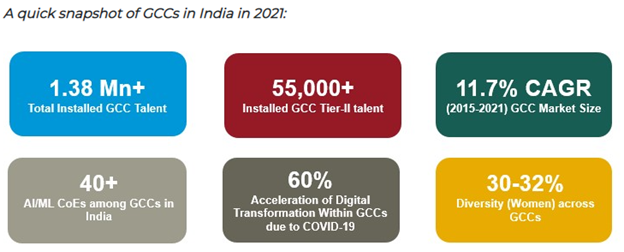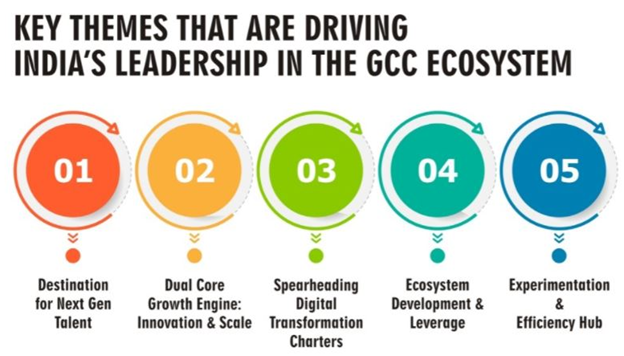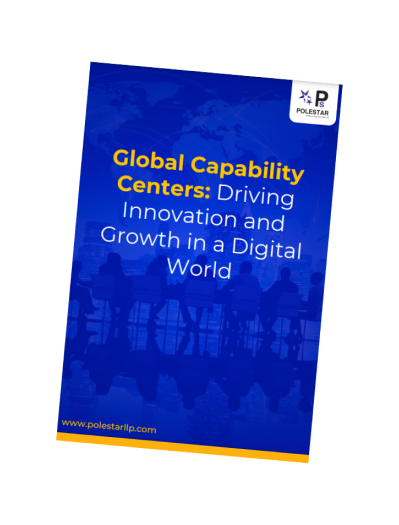The world has become more digitized than ever before. Industry 4.0 was on its way even before the pandemic started. The lockdowns and work-from-home (WFH) mandates associated with the pandemic gave digitization a turbo boost. More and more consumers now prefer to engage with firms in a digital model only. Artificial Intelligence, automation, and machine learning have become commonplace.
The pandemic was a period of great difficulty and uncertainties, with organizations scrambling to adapt and function to the challenges. While some companies remained forced into adapting to new ways of working due to the criticality of services/products (example: FMCGs on supply chain, Financial service on essential banking, and stocking food items on shelves), a few others followed a more wait-and-watch approach.
In the case of GCCs, while initially there was uncertainty and a focus on products/services of significant nature, throughout the pandemic, Global capability centers (GCC) as a group saw sustained growth, proving their resilience GCCs contributed to the economic recovery as they continued to expedite their footprint in India through the pandemic rising.
In such a digital-first world, organizations have no option but to accelerate their tech adoption. But they face multiple bottlenecks, disrupting existing models and the need for speed in an increasingly fluid business environment. Global Capability Centers (GCCs) have become a key enabler for overcoming these challenges and accelerating tech adoption in enterprises.
What are Global Capability Centers (GCCs)?
GCCs are captive centers that handle operations (back-office, support, and contact centers) and IT support to enhance productivity. It has evolved from back-office operations into value-added, business-critical operations that drive global functions. Where they previously concerned themselves with overseeing support functions’ operations and IT support, many GCCs have matured into owning these processes for parent organizations, running their R&D centers, driving product innovation, and building e-commerce capabilities.
In the past two decades, these captives have evolved and moved up the value chain as a Center of Excellence (CoE), performing numerous functions such as automation, innovation, and business analytics to build advanced digital competencies for the parent organization.
Get in touch with us to overcome challenges and accelerate tech adoption to drive critical operations.
Current GCC Landscape
The Global Capability Center (GCC) landscape has evolved significantly in the last decade, making India home to 1,300+ GCCs and employing over 1.3 million talented individuals. As per the joint report by Deloitte and NASSCOM, these centers contribute 1% of India's GDP. They also facilitate revenues to potentially scale up to $60–$85 billion by 2022 from its $33.80 billion figure in 2019–20.

Source: NASSCOM
In the last decade, GCCs have evolved from back-office operations into value-added, business-critical operations that drive global functions. Where they previously concerned themselves with overseeing support functions' operations, and IT support, many GCCs have matured into owning these processes for parent organizations, running their R&D centers, driving product innovation, and building e-commerce capabilities.
Expansion and growth are significant in this space. The winning combination of a distinct, well-executed strategy and a thriving ecosystem in India provides the proper support for this accelerating transformation and expansion. GCCs should focus on empowering purpose-driven growth by building a valuable network in the industry, developing programs that summarize learnings and best practices, and forming an internal pool of Business Service leaders and experts.
The Changing Role of GCCs in India
Today, Global Capability Centers (GCCs) priorities have shifted from back-office tasks to technology and innovation-led initiatives. As organizations look at aligning with the new emerging business paradigms, global capability centers (GCCs) will also have to alter their strategies. In the pre-Covid-19 era, GCCs continued to mature and evolve, albeit organically, to deliver a value proposition that has indulged a combination of cost, capability, and capacity arbitrage.
Well-operated and integrated GCCs consistently delivered superior cost, productivity, and talent (quality, retention) metrics. However, the traditional value proposition quickly became obsolete within months of the pandemic.
Further, as organizations transformed from centralized manifestations to globally distributed teams, numerous GCCs have been able to successfully demonstrate the power of GCC-enabled workforce transformation with - unfailing business continuity, uninterrupted availability, and, in many cases, critical impact on productivity and business outcomes.
As GCCs thrive in the country today, business leaders are expected to push the frontiers of technology and build trust with their parent organizations to rapidly scale GCCs in the immediate future. The below image is structured around five key imperative that defines the journey of GCCs in India and talks through how the GCCs have been adding value to their parent organizations vis-à-vis contributing to the Indian ecosystem, along with a projected way forward section.

How Business Heads are enabling GCC to fulfill their imperatives?
1. Increase investment in technology resources
During the pandemic outbreak, we saw GCCs shift their ERP and legacy apps to the cloud and increase the adoption of technologies such as advanced analytics, artificial intelligence, and ML, among others, across different functions. This surge in investment in tech resources, be it data mining, tech talent, tech tools, processing, etc., will only crop up pace in the coming year as there is a huge demand from the parent companies for the GCCs to drive innovation and become tech hubs for the organization.
2. Hybrid working model
In the current scenario, the prime focus is on a hybrid working model and the requirement for flexibility for both employers and employees. It can be expected that the hybrid working model will be the new normal going ahead in 2022 and a natural choice for Global Capability Centers (GCCs) in India.
3. The massive increase in Talent Pool
As GCCs continue to focus on change and innovation, the need for talent with niche skills continues to increase. In the long term, collaboration with start-ups, industry bodies, and educational institutions will also play a key role in building a business-deployable pool of resources. These steps will help GCCs continue to act as an innovation engine and drive new ideas across their organization.
4. Agility
Agility and speed are critical with digital technologies. A company's digital operations are fast-paced and require high levels of interactivity and collaboration. As an internal shared services organization within the company, GCCs provide the control, confidentiality, and transparency needed to quickly adapt to the business's priorities and facilitate speed-to-market with digital technologies.
5. Risk Mitigation and cyberattacks
In the past few months, we've seen more instances of data breaches due to remote working compared to earlier years and loss of confidential information owing to increased cyber-attacks. This threat will likely increase in 2022 due to digital transformation initiatives, hybrid working models, misinformation campaigns, ransomware attacks, and deep fake technology. GCCs will help organizations stay aware of these risks and ensure that they have suitable solutions and measures to prevent them without disrupting their normal business flow.
Expand your business, improve your operations, or drive digital transformation, we have the expertise and resources you need to succeed.
Conclusion
While the GCC ecosystem has grown over the years, there is a crucial opportunity for growth in the coming times. Leveraging modern techs can go a long way in transforming the face of GICs and can help them achieve higher efficiency, lower costs, improved employee retention, and enhanced business agility.
Moreover, it should also focus on bridging the demand-supply gap in skills and continuous reskilling/upskilling of the workforce to develop India as a global Global Capability Center (GCC) hub.
To sum up, this blog has a look at the key themes that reflect the maturity of the GCC Ecosystem in India.
--Driving-a-Holistic-Transformation-Of-The-Future-Ready-Enterprise-banner.webp)



